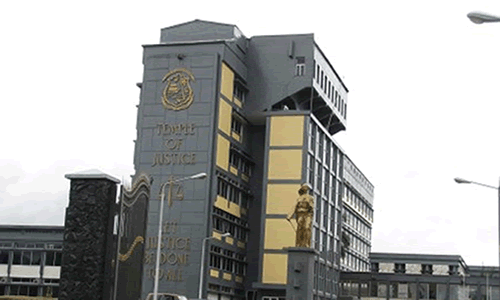
The second defense witness in the Sable Mining case Mr. E.C.B. Jones has told the hearing at criminal Court “C” in his testimony that “there are several instances, contradictions and misstatements of facts” in the allegations against the accused.
The former Deputy Lands and Mines Minister is on trial along with former House Speaker J. Alex Tyler, Grand Cape Mount County Sen. Cllr. H. Varney G. Sherman, Bomi County Sen. Morris Saytumah, Dr. Richard Tolbert and Mr. Willie Belleh and others following the indictment here which was prompted by a Global Witness report in 2016 titled the Deceivers.
Global Witness and the Liberian government accuse the indictees of receiving alleged bribes totaling US$950,000 offered by British mining firm Sable Mining to change Liberia’s Public Procurement and Concession Commission (PPCC) law to give the company undue advantage over mineral deposits at the Wologisi Mountain in Lofa.
But Mr. Jones, a mathematician and engineer terms the accusations as “false, illogical and virtually impossible” for anybody to have planned and intended to change the PPCC Law to give Sable Mining undue advantage.He explains that one thing he learns in logic is that “no one can hold you responsible for doing what is impossible to do.”
Responding to claim that he received $5,000 to provide technical advice for the changing of the law, Mr. Jones says it became his official duty to provide technical advice to both local and international experts when government decided to amend the PPCC Act of 2005 to harmonize it with the Mineral Mining Law of 2000.
He recalls that when former President Ellen Johnson – Sirleaf took over in 2006, there was this PPCC Act that required competitive bidding for all mineral licenses without differentiating between Class “C” Licenses intended for artisanal/ small skill miners who did not understanding bidding.
He tells the Court that the law actually froze the operations of the Ministry f Lands and Mines and threatened the subsistence of hundreds of thousands of Liberians situated all over the country, most of whom had just put down their guns had gone to the mines to make their living.
He stresses that government could not stop the miners in bush from mining, and yet it could not make money and issue licenses.
As such, he testifies that the government at the time was compelled to take affirmative action to harmonize the conflict between the PPCC Act of 2005 and the Mineral Mining Law of 2000.
[bsa_pro_ad_space id=1]
Defendant Jones indicates that the government appealed to international partners to hire international consultants to work on the harmonization of the law.
Between 2007 and 2009, he recalls that a Ghanaian expert Mr. Free Tsikata was in charge of coordinating the harmonization of the two laws – the PPCC Act and the Mineral Mining Law of 2000.
He says due to the urgency of the matter, it was decided that the PPCC should issue am interim regulation allowing Lands and Mines to issue exploration licenses without going through competitive bidding process.
By 2007, defendant Jones testifies that the interim regulation #002 was promulgated under the signature of the late KieveJugbah, stating that it was not signed by then Lands and Mines Minister Eugene Shannon.
He narrates that the principle in that Regulation #002 is the same principle that is enshrined in section 75 of the Amended and Restated PPCC Act called the “First Come, First Assessed” or “First In, First Assessed.”
Mr. Jones explains that this first come first assessed doesn’t say the first comer will get the [rights over the mineral], instead he says it means the first comer will be assessed while the other people will stay in the queue.
According to Mr. Jones, Ghanaian expert Tsikata wrote a report in 2009, suggesting that the procedure that was being used in the interim regulation #002 was conformant to international best practice in the mineral industry, but underscored that it had problem.
According to him, Mr. Tsikata suggested that to legislate the regulation, it should be lifted and put in the PPCC Act that was prepared as a basis of experts and government technicians who have the practical and grass root knowledge on how these laws work in Liberia.
He notes that by 2009, all the technicians and consultants had agreed that the draft was a in a state that it could be submitted to the president for her approval and for onward submission to the Legislature for enactment.
He argues that the law was not changed by the legislators or the defendants.
He has begun facing cross examination with the prosecution, which continues today, Tuesday, 9 July. Cllr. Wesseh A. Wesseh and Cllr. Jerry Garlawolo are the state lawyers in the case.By Winston W. Parley




















